#av writes
Explore tagged Tumblr posts
Text
You'd been deep in conversation with Beckman for the better part of an hour when your lover sidles up behind you, leaning into the sound of your voice. Shanks says nothing, doesn't interrupt, simply presses a lingering, tender kiss to the crook of your shoulder, the scrub of his beard warm and familiar as he settles in against your back to listen.
You hum contentedly and lean back against him, hand dropping to rest over his when he wraps it around your waist; Beckman responds to you, the gruff man betraying nothing of his reaction beyond the slight glimmering of warmth in his dark eyes--he'd never admit it outright, of course, but he dearly loves seeing his captain happy like this, loves that his friends have found such joy in each other.
Behind you, Shanks shifts, something light like laughter rumbling through his chest and against your back at something you said. You smile and nestle into him a little more tightly, that seed of contentment blossoming into something more steady and full when he squeezes you a little tighter in return. His chin shifts against your skin until you can feel the softness of his cheek resting further out against your shoulder. When you turn your head slightly to kiss his chin, Shanks sighs softly, almost dreamily, breathing the same contentment you feel out into the air between you.
Beckman, sensing the impending loss of his conversation partner for the evening, lights another cigarette, hiding the curve of a smile behind filter and flame as Shanks lifts his hand from your waist to tuck your hair back behind your ear. Affectionate, gentle.
"Everything alright, love?" You ask him softly, sweetly, turning to properly look at him at last, sinking into the endless deep of his warm, brown eyes.
Shanks smiles at you, wide and easy, and nods against your shoulder before turning his head slightly to press another kiss there.
"Just wanted to be able to see you while you're talkin', darling," he says earnestly, unabashedly, complete adoration etched across his beautiful features. He feels it when you blush, even before the heat rises to your cheeks, laughing as you grin; he watches the way your nose crinkles in giddy affection, commits to memory the little peek of your tongue between your teeth and the way your brows draw together just before a soft peal of laughter escapes you.
Beckman kicks his feet up on the table and leans back in his chair, exhaling a plume of smoke up at the sky to give you a moments privacy when you turn in Shanks' grasp to kiss him, to slide your palms against his cheek and into his hair, to really hold him for a moment the way he's always holding you.
The conversation dies then, for a time, but not unhappily so, the silence and warmth that ensues just as comfortable as the talking had been. When Shanks folds you in against his chest, mission accomplished and well pleased, the thrum of his heartbeat beneath your ear sings to you a familiar song.
You're home, you're home, you're home.
#av writes#drabbles#op x reader#shanks x reader#Shanks#Benn#something a little closer to substance at last lmfao#I am in sinus infection misery and wanted something nice so here we are#he's just such a sweetheart to meeee :(#Benn who is long accustomed to his schmoopy captain and his captain's#equally schmoopy lover just melting into each other like this lmfao
256 notes
·
View notes
Text
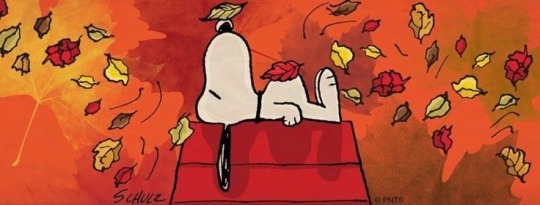
Hey! Introduction post because I'm redoing this blog!
I'm Av!!
My pronouns are she/her & they/them (:
I will write:
˚₊ ˚ ‧₊ .:・˚₊ ˚ ‧₊ .:・˚₊ *˚˚₊ ˚ ‧₊ .:・˚₊ ˚ ‧₊ .:・˚₊ *˚˚₊ ˚ ‧₊ .:・˚₊ ˚ ‧₊ .:・˚₊ *˚
- fluff
- angst
-comfort
- x reader
- songfics
- character x character
˚₊ ˚ ‧₊ .:・˚₊ ˚ ‧₊ .:・˚₊ *˚˚₊ ˚ ‧₊ .:・˚₊ ˚ ‧₊ .:・˚₊ *˚˚₊ ˚ ‧₊ .:・˚₊ ˚ ‧₊ .:・˚₊ *˚
I will NOT write:
- nsfw
- smut
- pedophilia
- incest
˚₊ ˚ ‧₊ .:・˚₊ ˚ ‧₊ .:・˚₊ *˚˚₊ ˚ ‧₊ .:・˚₊ ˚ ‧₊ .:・˚₊ *˚˚₊ ˚ ‧₊ .:・˚₊ ˚ ‧₊ .:・˚₊ *˚
Fandoms I write for:
Five night at Freddy's (2023)
The Owl House
Newsies
Dear Evan Hansen
Percy Jackson (2010 & 2024)
(i promise I will update this i need to watch more movies/shows 😭)
But thank you for reading!! Requests are always appreciated!!
#av writes#1989luvr#1989luvr updates#dear evan hansen#newsies#five nights at freddy's#josh hutcherson#mike schmidt#mike schmidt fanfic#mike schmidt fluff#mike schmidt x reader#peeta mellark x reader#peeta mellark fluff#percy jackson#percy jackon and the olympians#percy jackson and the sea of monsters#clarrise la rue x reader#luke castellan x reader
9 notes
·
View notes
Text

38K notes
·
View notes
Note
hiiiii dee !! omg i was so excited to see you have a drabble event. oliver w wake him up, if you please?
— ave
oliver aiku x reader — 18+, morning after

Can a pro footballer not afford fucking blinds?
It’s the first thought that stretches awake in the shallow sea of your sleep-addled brain as you find yourself bathed in what’s quite frankly an obnoxious amount of early morning sunlight.
And this is what naturally leads into your second thought, one that clicks into place with unnerving clarity mere moments before your gaze falls on the sight of a football jersey hanging over the back of a chair.
You let out a quiet, resigned exhale before carefully turning your head just enough to see the culmination of last night’s collective assortment of bad decisions: a shirtless Oliver Aiku, fast asleep and snoring softly on the pillow beside your own.
He’s facing away from you, dark grey sheets pooled at his waist, and you have to mentally slap yourself for the way you find yourself suddenly distracted by the smooth, wide, muscled planes of his back.
You’re only wasting time letting your traitorous eyes sweep over his sleeping form, tracing a map along the source of each tender, pliant, well-fucked ache that lingers across your body.
You really need to leave—
But the sheets shift with you as you go to extricate yourself from the tangle of them, and the mattress groans in protest as Oliver rolls over and slings a heavy arm over your hip. And it’s infuriating, the magnetic pull of his body heat as he curls around you.
“Are you sneaking out?” he murmurs in a sleep-rough voice against the nape of your neck.
You try not to shiver at the sensation.
“Oliver,” you sigh. The exasperated way you say his name is answer enough.
His hand slips up beneath the shirt you’re wearing, his shirt, and he slowly strokes your hip, thumb catching against your underwear.
“I drove you here,” he reminds you, and each word feels like a kiss.
“I can get a Lyft home,” you reply mildly.
Oliver huffs in amusement before he rolls you over onto your back, and you resolutely stare at the ceiling as he rests his chin in the dip of your collarbone. The scruff of his beard is scratchy against your skin, and you’re unreasonably annoyed by how much you don’t hate the feeling of it.
You swear you feel him smiling, even if you’re pointedly not looking at him.
“Let me make you breakfast, and then I’ll drive you back to your apartment. And we can both pretend you snuck out and left me high and dry without saying anything, if that’s what you really want.”
You sigh, turning to look at him and hating the way your heart fumbles around within the tight confines of your chest cavity when your eyes meet his.
He grins.
Twenty minutes later, you come hard seated atop the cool marble countertop in his kitchen with Oliver's face buried between your spread thighs, your fingers tangled in his messy hair, and the scent of nearly-burnt bacon wafting out of the frying pan.
He cajoles you into a shower after, and it’s a lost cause trying to muffle the desperate, needy moans that echo off of the bathroom walls when he fucks you deep and slow up against the tiles under a hot spray of water.
And even if he keeps his promise not to walk you to your door, he still hooks a finger in the back pocket of your jeans and tugs you back down into the passenger seat when you go to get out of his car, his mouth catching yours in a soft, tender kiss.
–
Later, with a clipboard in your hands and an ID tag hanging from the bottom of your track jacket that reads ‘ASSISTANT MANAGER - UBERS’, it’s all you can do not to deck Oliver in the head with the former when he has the gall to blow you a goddamn kiss as he jogs out onto the pitch.
#oliver aiku#oliver aiku x reader#blue lock#dee writes#noun/verb drabbles#hi ave<3!!!!#⚽️🌙#rambling: o. aiku
423 notes
·
View notes
Text
thinking about accidental pregnancy with oliver, about keeping the baby, or wanting to keep the baby and. you're not expecting him to stay, really you're expecting him to run. he's not serious about you, about this, neither of you are... and he's an athlete at the rise of his career, you're not expecting him to stay. he does.
if there is one thing that could override oliver's flightiness, his instinct to bolt, it is responsibility. and you've just dropped the biggest responsibility of his life in his lap. oliver's never committed himself to anything except for the responsibility he holds to others, whether as captain, son or now... a father, a responsibility you've tied him to with an umbilical cord. oliver aiku does not let go of responsibility; he builds his life around it.
when you tell him, you expect him to fade out of your life. you expect panic and for the urge to flee to overwhelm him, it's something you've made your peace with ever since the ultrasound.
(pregnancy tests can be unreliable, can give you a false positive, and that hope and joy that bloomed in your heart at the sight of those two lines? it felt too dangerous to nurture without absolute certainty. you had to make sure.)
(you're pregnant.)
there's panic, but he doesn't flee. he asks you, with low tones and serious eyes, what you'd like to do — something unspools in your shoulders, then, and you say with complete confidence that you'd like to keep it. this is your child. you want them more than anything. he doesn't flee then, either.
he drives you to every appointment, stays with you through each one, too. he sits on that chair and asks the doctor questions, asks after the baby's condition, their health, progress and risks. he's... a father, you've come to realize. a good one.
it takes nothing for you to fall in love after that. after all, what's been holding you back all this time is the knowledge that, despite his charm and charisma, oliver is... flighty, a man that's allergic to commitment, he's had a dozen men and women before you and he'll have a dozen more after you — he was never going to be present. so seeing him now, like this? his charm and his charisma coupled with his attentive support? a steady rock you can be sure will you hold up, unwavering under your weight, when you lean on him? reliable. constant. to see oliver aiku fully present with you, to see oliver aiku crystalized? he's beautiful.
you fall.
you understand now, the complete faith his team has in him, their steadfast loyalty and unfaltering affection. this oliver... he does not demand it, per se, but he gives so much of it that it becomes unquestionable to do the same.
you love him.
and years down the line, looking at oliver cuddle your toddler to sleep? you think to yourself that you're glad none of his exes had thought to baby trap him to keep him, because now... you know with absolute certainty that it would've worked.
366 notes
·
View notes
Text
The Portrayal of DID in Ave Mujica
(I have to preface this by saying that I am approaching this from a narrative writing standpoint and from my own personal delving into psychology overall. The subject topic is complex and the medical knowledge on it is ever-evolving, so if any of my notions are outdated, I am very, so very sorry.)
(I also understand that the topic of trauma and DID might be a triggering experience to some people, so caution is advised.)
(The discussion will also have open spoilers about the show and as such is tagged with spoiler tags.)

If there's one thing I would never expect when watching a music show, it is for it to turn into a deeply introspective psychological drama about flawed characters grappling with anxiety, mental wellness, toxicity and so on.
I did something like this a few times before and I can't help but want to explore and convey my thoughts on the character writing and handling of dissociative identity disorder within this show.
Now, Ave Mujica's predecessor, MYGO (to which Ave Mujica is a sequel), did play with the portrayal of neurodivergent-coded traits and still remains one of the best attempts at that overall, but a lot of that could be written off as subtextual.
So Ave Mujica portraying DID (Dissociative Identity Disorder) in a textual way comes as a surprise.
What's even bigger surprise is the lengths the show goes to make the portrayal feel authentic and how up-to-date the overall knowledge within the writing is.
Now, for starters, some explanation is needed.
What is DID?
Dissociative Identity Disorder (DID) is a type of dissociative disorder that usually develops in early childhood due to traumatic experiences—most often emotional or physical abuse or neglect.
The conditions within the environment lead to a child failing to integrate into a unified identity due to compartmentalizing their trauma and various other facotrs. In layman's terms, "distancing themselves" from their own psychological trauma.
The key aspect to understand is dissociation, a concept that is crucial to DID but NOT limited to it. To quickly explain what dissociation is—to handle specific amounts of stress and trauma, the brain copes with the information via "disconnecting" one's sense of self from perception.
Dissociation is actually a very common reaction to trauma and can manifest in different ways without it being DID (hence dissociative disorders being a whole branch of stuff)—like, for example, dissociative amnesia, where a person might forget selective memories associated with a traumatic event.
Grief tends to sometimes lead to dissociation, especially during the early phases, too.
Another common example is depersonalization, which involves "perceiving yourself as an out-of-body observer," which usually involves an altered perception of time too, with time slowing down or speeding up or the concept of time losing meaning.
Both of those can manifest as part of DID, but can also exist separately—for example, derealization and depersonalization can be symptomatic of PTSD.
DID in itself as a concept is about a person at a young age failing to integrate into "one".
The way a child's growth goes is that the mind reintegrates and parses those their experiences and traumas shaping their identity. Experiencing dissociation doesn't instantly mean DID, because dissociation by itself is a common trauma-parsing mechanism, as I said before. A child can experience trauma, neglect, or abuse without it leading to DID.
In the case of DID, the child fails to integrate, the trauma/abuse/neglect instead leading to compartmentalized elements working together—a system.
It's important to note that trauma doesn't create alters, as it's been thought for a while. It's not something fake or "split" or "created"—the system is all the alters as equally "real"; it's just that alters themselves might have different traits of the identity.
While alters are identities, they aren't necessarily separate people—they are a system. Alters might differ from each other, and have separate memories, and skill sets, but every alter is part of that system. Alters don't appear out of thin air as separate entities and it's better to view a system as an entity comprised of equally real alters functioning together, with the "primary" one (the one that's out for the longest periods) being often called "the host".
Thus, alters can be subtle and almost indistinguishable from the host. And even if they have distinct personality traits, most alters would have an awareness to "fit in" by not standing out, instead internalizing them and trying to mimic the host personality (because it's "normal").
There isn't a secret evil spirit or a ninja assassin living in a person—portrayals like that (ex: the movie "Split") are extremely harmful because they perpetuate a toxic stereotype that just isn't true.
There's no "real personality and fake personalities" and so on. The current understanding of DID is a child at a young age, due to internal and external factors, failing to integrate into a singular identity.
Now depending on how young we talking, the person might have had a personality-before or might not have at the point DID develops, but the concept of "original/core" personalities is currently considered antiquated.
And just like alters aren't "created," they can't "die" either.
Now that this covered basic terminology and information, I can actually discuss about the show itself.
First, let's talk about Mutsumi and her character.
Mutsumi
From the very first appearance in MYGO, the characterization conveys the personality of someone who is stoic, internalizes her emotions, and has trouble communicating with others—her first spoken line in the show is ambiguous.
Mutsumi is a stoic, shy student who had been in a band together with her childhood friend, Sakiko, and three other people. The band imploded after her childhood friend suffered from circumstances she felt she couldn't share with others and disbanded it.

The character is often coerced or influenced by others to do things for them and plays more of the role of an observer.
It becomes quickly obvious that Mutsumi herself is extremely uncomfortable with this role—not only blaming herself for the band's breakup but also feeling awful about her friends' mental well-being afterward.
Meanwhile, Mutsumi's childhood is no better—as a child of a star actress and a famous comedian, Mutsumi didn't have what one could call "a normal childhood.". Her parents had surrounded her with wealth but at the same time had adopted a completely hands-off approach, which led to her feeling neglected and alone. For example, she doesn't even call her mother and father dad/mom/father/mother/etc., instead opting to refer to them by their first names like friends would do. The mother is also enamored with being an actress—for example, one of the things she would offer her daughter's friends visiting would be to watch movies she starred in.

The show makes sure the audience gets a sense of the scale of her home life—a luxurious house filled with servants where her mother is a star rather than a parent.
What's more, due to the circumstances of her parents she's constantly compared to her mother and father and their talents, with expectations placed to follow in their footsteps. This ends up with her feeling like she has nothing of her own in her life—whatever praise or expectation is placed upon her ties to The Star Actress and The Comedian instead of who Mutsumi is as a person.
As a result, she values the bonds she has formed with other people a lot. She cares deeply about her childhood friend (whose family circumstances are the actual reason for the band breakup), and she cares about the one other bandmate who had kept in touch with her (the person who is mainly keeping in touch due to selfish goals though).
So when her friend decides to create a new band, Mutsumi feels responsible to support her and help her.
Unfortunately for her, her friend is going through a lot emotionally, and the entirety of the new band consists of a lot of openly toxic individuals.
Thus she is placed into a situation where she has to juggle the neglect and distance she feels at home, the expectations her suffering friend is placing upon her, the expectations the world has for her due to her parents, and the pressure from being a member of an extremely popular band—a tough deal for someone who from the beginning had trouble expressing herself.
But hey, at least since the band has the whole pseudo-visual-kei thing going for it, she will be able to wear a mask.
Which is where her journey through Ave Mujica starts.
Ave Mujica and DID
The first notable thing we see happen is her struggling with an interview, reinforcing the idea that she has trouble expressing herself.

Ironically, this is another case where someone else ends up speaking over her.
The episode ends with the first notable trigger for her emotional state worsening, which is one of the bandmates going off-script and ruining the whole "secret identity" thing by unmasking them live on stage to an audience of hundreds if not thousands.

Considering her character set-up and her issues and insecurities, this is about the second most terrifying thing to Mutsumi in the entire world.
As the bandmates argue and blame each other over what had happened, the show then proceeds to take time to showcase how the pressure and the stress of what had happened affect her psychologically and emotionally.

This is a character who had been defined by the impostor syndrome caused by the neglect of her parents and comparisons society draws to them due to their fame—essentially getting doxxed live to an audience of hundreds if not more.
The show then dedicates its runtime to showcase how this character is slowly ground down by the building up pressure and anxiety, the dam breaking due to the traumatic experience—especially when she flubs an interview, causing even more tension and pressure.

"Don't speak out; play your role; don't make mistakes; be perfect or people will hate you."
The show makes sure to slowly build tension and highlight the growing anxiety and the increasing levels of dissociation the character experiences from the world around her as she goes through interviews and photoshoots—interactions that only worsen her mental state by anxiously comparing her to her parents or reminding her of the mistakes she made, as numbness overtakes her.

The anxiety, the stress, and the tension within all build to the point of insomnia as the character retreats to the one place she was implied to feel safe in throughout the show—the rehearsal room at home where she would spend time alone playing her guitar.
Because, again, as implied, her parents don't exactly pay any attention to her beyond showering her with wealth, and everyone else views her as an extension of her parents. So for her this is one spot that is truly hers.
And even that spot has now been taken because her mother had offered the whole band to use the rehearsal room. It's no longer just her space.

Depression, anxiety, and insomnia are but a few of the things that both influence and happen as a result of dissociative disorders
The show highlights the character's worsening physical state due to her deteriorating emotional state, to the point that the character has trouble walking down the hallway.

More importantly, the people around her—her band, her parents, her friend—they don't realize that. If anything, they put more pressure on her shoulders, they tell her to not stand out, to play the role to perfection, to not ruin the performance or further ruin the band's reputation.
The pressure and tension build to the point where the show depicts the first on-screen dissociative episode for the character.

Experiencing dissociation from gazing into a mirror is actually pretty common, as is the idea of recognizing your reflection as someone else. It's not limited to DID, however. There are common experiences where people suffering from anxiety might feel a sensation that they are looking at a stranger for example. Gender dysphoria might also elicit a feeling that the reflection is "wrong".
The show also showcases another common DID symptom: losing large chunks of time as the character finds themselves jumping from the changing room to the middle of the scene without knowing how she had gotten there.

The scene also involves the character witnessing(and more importantly, recognizing) multiple of herself. While the most common way for the host personality to perceive alters is auditory, visual perception is also possible, as are all other senses.
The series of visual hallucinations ends with a character making a mistake live on stage and experiencing a complete dissociation as she slumps onto a stage prop chair motionless like a doll with strings cut..

Essentially, this is a moment when no one is in control. The host personality has experienced complete dissociation, but neither the host personality nor any alters are "behind the wheel.".
Now, to this point, the idea is still subtextual (barely) in that the story shows but doesn't tell what is happening.
However, what comes after this grows more and more textual.
The dissociative episode and perceiving multiple of "you" leads to the character experiencing even more vivid hallucinations.
This time, however, the character directly acknowledges and converses with an alter within her mind-space.

Having a healthy and proper way of communication between host and alter(s) is actually crucial to functioning as a healthy system and living with DID.
Most of the conversation, however, happens within mind-space, as the character relives her past experiences and memories as if she were watching them as an observer, with the alter narrating her life's story.

The mindscape is often metaphorical so the alters don't necessarily always appear human, but they always would be "humanlike", because the brain perceives the alter as alive. The form alters might take within the mindscape is often dependent on the kind of trauma a person has suffered.

The story as narrated by the alter establishes the reason behind why the character values playing the guitar so much—because it's something truly hers, something she had learned on her own and something that is in no way "because of her parents".
But she feels like she's not good enough.
She can't be expressive, she has trouble communicating her emotions, and thus her playing skills, while technically perfect, lack that self-expression capability.
She can't make the guitar sing.
And thus due to impostor syndrome, she concludes that being "wrong" somehow is why the bands she gets involved with on her friend's behalf keep breaking up—why her best friend keeps suffering.
A person suffering from anxiety, trauma, and neglect, someone who has issues expressing themselves, would often wrestle with issues of self-hate and depression and Mutsumi is no different there.

Experiencing one's own memories from an outside perspective, as if watching a movie or seeing themselves from outside observing something is once again quite common in terms of DID.
As the toxicity within the band keeps growing and her friend keeps suffering, the character's anxiety and stress build further, the auditory and visual hallucinations intensifying.

Just a reminder that while this goes on and Mutsumi slips in and out of her mindscape, her best friend, her parents, and the whole band are completely unaware of any of this. In their minds, the dissociative episode she had experienced was "her acting out" or "acting" or just being "closed-off".
This is the first case where the alter has a direct and open back-and-forth conversation with the Mutsumi, rather than narrating her life like before.
Alters within a system often end up serving specific purposes—because they are more comfortable doing something the host alter isn't. Sometimes it's a single memory the host can't parse or a personality trait.
The alter in question showcases worry for the host's well-being—A Protector.
The alter represents worry over the character's own well-being and where the current stressful self-destructive path may lead.
(Important Note: I do feel the need to say that alters do not neatly fall into classifications and there's not some "class system" for Alters that is always true. There are many complex reasons for how alters within a system can be and there's a lot still unknown, as is true with the overall human mind. Since alters aren't created or "split", an alter merely providing a specific role doesn't mean they exist solely for that role, as it becomes clear with the case within the show too.)
The alter believes that if Mutsumi stays with the band, she will experience the full brunt of the band imploding and the alter also perceives Sakiko as someone who is not healthy for the character—toxic even.
Mutsumi however reaffirms that she wants to support her friend no matter what, to always be by her side.
Eventually, however, as the days go on, and the band keeps arguing, the character ends up tying together what is happening now with a traumatic event in her past—her best friend's previous band imploding in a similar fashion.
The character draws parallels between the two situations—between two traumatic experiences—which further worsens their wellbeing.

As a side note I do love Dutch-angles and how universal they are in conveying things going wrong somehow or being unsettling.
All of this leads to the final straw—a confrontation with her best friend, where the character ends up being accused of "not being good enough" and "not supporting her like a friend should".
Why can't she smile or talk or be more social?

Now I do feel the need to interject and say that while her friend is completely in the wrong here, things aren't that simple. Sakiko also has her own issues, depression, traumatic experiences, and absolutely horrible life—all of which she is unable to properly parse and thus turns towards alienating everyone who cares for her rather than showing how hurt she is.
This is the final straw, the moment where the anxiety and traumatic experiences build up to the point where the host just wants to escape.
A moment where subconsciously she'd want to turn to the someone for help.

This is also the first time this alter is properly given a name (one of Mutsumi's stage persona, Mortis).
The scene is eerie and haunting, but it has to be—sleeping is as close as the situation can get to ego-death.
(Because, like I mentioned before, parts of a system can't "die".)
Once the stage play starts, both the bandmates and the audience are treated to a performance that is unlike the character's usual self.

Mortis fulfills their role, shielding the host from a traumatic experience, taking it up to themselves to do something the host would suffer trying to do. In this case, it's to pretend everything is fine and play the role her best friend expects her in the band—to smile and to talk and to help keep it together.
From this point on, Mortis is in control.
She smiles, is social, and delivers efficient jokes to lighten up the mood—she pays attention to the wellbeing of other bandmates and is extremely expressive.

It needs to be noted that the bandmates and parents STILL have no clue. The other bandmembers barely knew her for a month so they don't really see anything wrong with the change in how the character behaves. If anything they see it as an improvement.
Mortis is doing everything they can to do what the host was too anxious to—to be a perfect actress, supportive and caring for the band, and nurturing an environment where the band stays together.
There are a few problems, however.
For starters, Mortis doesn't know how to play guitar, at all.

It's a skill and talent the host alter developed and as far as systems go not everyone would have access to the same memories, experiences, or skills and it's possible for alters to develop different skills than the host too.
And second of all, as the one who wants to protect Mutsumi, Mortis feels disdain towards the main source of Mutsumi's anxiety and depression—her childhood friend, Sakiko.
In Mortis's eyes, the dissociative episode the host suffered and the extreme amounts of anxiety and stress are all because of Sakiko.
This comes to a head in a scene where Sakiko, after spending a whole episode feeling uneasy because of how different Mutsumi is now, decides to have a one-on-one talk with her about what's going on.
It's in this scene that the show textually acknowledges DID.

What finally tips her off is that Mortis refers to her differently than Mutsumi would.
This scene also provides a direct affirmation of the fact that parts of a system don't "die"—they might however go dormant and "fall asleep".

As a side note, the scene does contain ominous framing, but it's mainly due to it mainly being from Sakiko's POV. The writing, however, makes it extremely clear Mortis isn't a villain as much as someone protective of Mutsumi and spiteful towards Sakiko due to her neglect of her best friend—and that Mortis isn't entirely wrong to blame Sakiko for this.
This is kind of surprising because that's pretty "new" information as far as the medical topic of DID goes. People used to think alters could die due to a faulty understanding of the idea stemming from the older now debunked theories as I mentioned before.
The reality, however, is, that alters aren't really something "different" nor "created/split"—a system has the same brain, and the same biological functions, which means the brain can't perceive itself as "dead".
DID develops at a young age due to neglect trauma or abuse. It doesn't suddenly happen because of some extremely tragic event as fiction often depicts it (the tragic events however can cause the host to dissociate and push specific trauma onto an existing alter).
The show, once again, acknowledges that too!

The scene basically spells out that Mutsumi's DID developed at a young age as a result of parental neglect and anxiety. Note that the show doesn't imply Mortis "having been created" ever.

Mortis basically spells out what Mutsumi wouldn't have been able to say—she speaks of the stress the band had caused Mutsumi and how Sakiko's neglect and toxicity ended up causing her to retreat into sleep.
(Once again have to add this: Alters can differ in terms of their thoughts, species, speech patterns, gender orientation, etc. Alters even can have different heart rates, eyesight, and how they respond to allergies.)
Mortis is resolute to protect Mutsumi and her band, but she's also a child—one that can be very blunt in the ways Mutsumi isn't and also naive in the way Mutsumi wouldn't be.
She can't help but detest Sakiko for her toxicity and the trauma it has caused.
She bluntly states that Mutsumi ceding control to Mortis is Sakiko's fault and if Sakiko keeps acting this way instead of actually parsing her problems, Mutsumi might never return.
Mortis isn't merely "a role protecting someone". She is childish and she is, in a way spiteful and she has an opinion about Sakiko that Mutsumi might not agree with.
There's a struggle there because the dissociation between the two alters is too big—there's a lack of communication as once Mutsumi gets to interact with Mortis again, the two are talking past each other.
Mortis is way too focused on what Sakiko had caused and on how it had hurt Mutsumi, while Mutsumi is still ever so focused on how much Sakiko herself is hurting and ignoring her own problems.

It's somewhat common for alters to communicate their memories or experiences with each other via mindspace creating a filing system of sorts as some described it as a computer with a search bar or a cabinet.
The show makes sure to highlight the dissociation currently between Mutsumi and Mortis and the communication between the alters having been strained due to conflicting motives and viewpoints on their mental wellness and how much a person Mutsumi cares about affected it.
The show also doesn't shy away from the problematic treatment of mental wellness in the world and how often it gets sensationalized.
The first major example is the public's reaction to Mutsumi dissociating on the stage—the band is flooded with demands to REPEAT that "performance". In fact multiple show appearances and stuff set that as a condition for the band appearing at all. To the public there's not even an ounce of worry that this was something real—to it couldn't have been anything but acting. Which is actually a common toxic reaction towards systems in the real world. Even within the Ave Mujica tags there were people screaming how "Mutsumi must be just pretending to have it".
Even one of Mutsumi's teammates mistakes her dissociation and Mortis for masterclass acting talent and is STILL haunted and feeling inferior by it even after she KNOWS what actually happened.
The characters also use the outdated term "split personality" when conversing about Mutsumi and Mortis and a majority of the cast doesn't "get" what this is and are way out of their depths—Sakiko blames herself for "having broken" Mutsumi, Umiri and Uika just completely don't care, Nyamu feels insecure and the MYGO cast are also just as out of their depths even though they display far more empathy.
It's a sheer contrast to one character who has no direct connection to Mutsumi but is known for her blunt nature and ends up recognizing both Mutsumi and Mortis as individuals (even asking for the name of each alter when they exchange introductions) and befriending Mortis.
Likewise, when Mutsumi and Mortis end up arguing over their motives and goals and falling down the stairs, the first reactions the onlookers have is to...snap photos and film the situation because it's a famous person and maybe this is some performance too! A completely cold and cruel audience of observes that keeps snapping photos even as another characters desperately begs them not to film this.

And of course, it gets shared and goes viral on social media.
Overall so far the representation of DID and overall mental-wellness issues in Ave Mujica (and MYGO) have been the series highlight and I certainly hope the show continues to treat the subject matter with care and research needed as it further delves into the character.
Another highlight is the variety of issues and insecurities the other main characters are facing—from Sakiko's complex traumatic experiences and implied self-harm tendencies, to Uika's obsession, to Nyamu's insecurities to Umiri's complete emotional disconnect and compartmentalizing to the point others see her as lacking empathy (even though that last scene implies it's not completely true, so we don't really know what's exactly going on there).
Ave Mujica, if it lands, is shaping up to be one of the best shows in a while when it comes to character introspection and psychological themes.
#bang dream#ave mujica#mutsumi wakaba#wakaba mutsumi#ave mujica the die is cast#bang dream ave mujica#bang dream girls band party#spoilers#sakiko togawa#togawa sakiko#umiri yahata#nyamu yuutenji#ave mujica spoilers#ave mujica meta stuff mine#ave mujica analysis#bandori#bandori stuff mine#Long Posts on Psychological themes within narrative writing#mortis ave mujica#uika misumi#tw: mental health#tw: dissociation#tw:trauma
327 notes
·
View notes
Text
haven't rly been talking about it on tumblr much but i've been following ave mujica n really enjoying it for a whole lot of reasons but i was actually rly surprised to see how many people seem really surprised/upset by the hatsuika reveal and what that means for her r/s with sakiko because for me, that fully felt like the missing piece that made this aspect of avemuji click into place for me - it felt like the final completion of all the things the show is exploring.
avemuji is (among other things but imo primarily) about the overbearing violence of existing as a child within the hierarchy of a family - as well as all the ways this manifests in the cast's biofamilies, avemuji itself can be understood as a sort of twisted deconstruction of the idea of a 'found family' group of friends in that it explicitly acknowledges and demonstrates that even a family of choice can be toxic, hierarchical and subject to abuse within its channels of power.
bc of this, incest is the natural conclusion of those themes and i genuinely think the story would be incomplete without at least gesturing to it as an idea - and moreover, i think it feels weirdly natural as the conclusion for uika's feelings about sakiko. romance is obviously and clearly a component but what she wants goes far beyond that - she needs saki to Save her, to fill every single lack and empty gap in her life, from playmate to lover to friend to protector to ward to family and even before that particular reveal, that all-consuming need struck me as being at least symbolically incestuous within the context of avemuji as a symbolic toxic family.
seeing it made textual - and by way of hatsuika performing a one-woman gothic horror soliloquy - makes me even more certain the avemuji writers know EXACTLY what they're doing and has me rly curious and excited to see how they're gonna bring it home.
that said. can someone please take mortis to like. mcdonalds or something. she's a little doll who is 3 apples tall she shouldn't be dealing with these band girl horrors!!!
#avemygo#ave mujica spoilers#for my onk moots. what i'm saying is.#hatsuika is like. what if ruby hoshino was gay. and had good writing.
216 notes
·
View notes
Text


ngl i always wondered why in the lyrics of killkiss, the lyrics mention three different names (judy, jude, and juda) rather than simply using “judas” three times but now im like!!! i get it!!! they reference uika’s names!! uika, doloris, and hatsune. judy, jude, juda. also also!! i looked up the origin/meaning of the names and i think it’s interesting!! they all share the same etymological root, namely the hebrew “yehudah”, meaning praise. it was also the name of a tribe in ancient israel (so the name can also mean “from judea”) and maybe im reading a bit too much into it and they just picked 3 names that sounded like “judas” and had the same amount of syllables BUUT. the different spelling is interesting to me okay!! “judy” as in the abbreviation of the feminine name “judith”, the woman who slayed holofernes (have a lot to say on judith but i’ll keep it short). then “jude” which is apparently (according to the internet) a gender neutral name (but mostly used as a masc. name). and then juda(h), the closest name to judas, a masculine name that despite its positive meaning, “to praise”, is doomed to betray. and i was thinking how uika/hatsune is purposefully presented on the androgynous side, with her bob and her shorts, and the 3 names are a typically feminine name (judy), a (maybe!) gender-neutral name (jude) and a masculine name (juda). nameless faceless genderless. empty. nothing. a black hole. a doll with a blank face and no body parts that can be stuffed and painted to suit the situation. i used to pray for characters like this
#i was writing this this morning omw to uni and my hands froze and i forgot it in my drafts. here u go#let me cook (guy who isnt cooking)#uika misumi#hatsune misumi#ave mujica#avemuji#bandori#bang dream#doloris#mine
169 notes
·
View notes
Text
How Behind-the Scenes Issues Affected the Writing of Doctor Who (Both Good and Bad)
Doctor Who is such a fascinating show to look at from a Watsonian v. Doylist perspective. Like, entirely just from an episode writing point of view:
Twice Upon A Time feels so slow and meandering and even boring in places because Chris Chibnall didn't want to start his run as showrunner and Steven Moffat didn't want the show to lose the coveted Christmas timeslot (ironic, I know) so he bumped the Twelfth Doctor's regeneration from the end of The Doctor Falls (where it makes sense) to the end of the Christmas special
Boom Town (my beloved) only exists because originally there was going to be an episode in its spot explaining that Rose had been molded to be the Doctor's perfect companion (by the Doctor, gross) and the writer didn't have the time to commit to the show
The ending of Last Christmas feels like one inside-a-dream too many because originally Jenna Coleman was questioning whether she was going to leave the show or not and the ending was rewritten after the first readthrough when she decided she wanted to stay for another season
The first five episodes of Season 7 feel like each one takes place in a different genre because that's literally how Steven Moffat pitched it to the writers; for example, A Town Called Mercy was literally pitched as "Doctor Who does a Western"
Not so much a weird one but one I find cool: Eleven's first words and Thirteen's first words were literally written by Moffat and Chibnall respectively, as they were brought in to write the first words of the first Doctors of their runs so as to make it cohesive
The reason why Fourteen isn't wearing Thirteen's clothes when he regenerates is because Jodie Whittaker is much shorter than David Tennant and Russell T. Davies didn't want it to look like he was making fun of the genderfluidity of the Doctor (still think he made the wrong decision, but eh)
Wilfred Mott isn't in the Runaway Bride and Donna's father isn't in Partners in Crime because the actor who played Donna's father, Howard Attfield, died after filming several scenes for Partners In Crime, leading to the character of "Stan Mott" from Voyage of the Damned being written into Partners In Crime as Donna's grandfather
Astrid Peth doesn't die in the original drafts of Voyage of the Damned, but Russell T. Davies wrote what is generally considered one of the most emotional deaths in Doctor Who just because he wanted Kylie Minogue to be able to focus on her music career
Originally Oxygen was written as a prequel to Mummy on the Orient Express, where a corporate representative appeared on a monitor. Said representative was fired for his fumbling of the station and would later live on as the company computer, Gus
During Season 11, Chris Chibnall had to do some major rewrites for many of the one-off episodes, therefore The Battle of Ranskoor Av Kolos ended up being a first draft that made it to screen. He later admitted it was his least favorite episode of the series
And this is only a fraction of what I found in terms of major behind-the-scenes writing reasons. Though I am still totally willing to critique the product that made it to our screens, finding out the reasons behind some of the more badly written episodes of the show really made me feel sympathy for every showrunner of the show as well as appreciate a lot of the good episodes that ended up here despite the short production schedule/unexpected problems (once again, Boom Town my beloved AND everyone's favorite companion Wilfred Mott only exist because of unforseen problems). Absolutely bonkers, isn't it?
#russell t davies#steven moffat#chris chibnall#wilfred mott#astrid peth#the battle of ranskoor av kolos#ninth doctor#tenth doctor#twelfth doctor#thirteenth doctor#jenna coleman#clara oswald#last christmas#twice upon a time#boom town#writing#behind the scenes#eleventh doctor#oxygen#mummy on the orient express#a town called mercy#partners in crime#fourteenth doctor#yes i did my research for this one#doctor who
819 notes
·
View notes
Text
okay BUT think about the way Shanks acts when you kiss him. The way he giggles into it at first, grinning against your lips with all the playful, casual joy that made you fall in love with him to begin with.
The way he wraps his arm around you, pulls you close, hums softly when it's clear you're not letting go, the way he breathes so slowly as the weight of it settles in his chest, soft and warm and soothing. The way he seems to pull all the breath out of you when he deepens it, the way the wind seems to tug at you like the whole world turns on your shared heartbeat.
think about the way his eyes glisten with something so tender it's almost wounded when you pull away just enough to tell him you love him. that of every soul alive and every treasure at sea, he's the one you want.
think about how Shanks is so easy and indulgent and giving with his affection, but rocked to his core by how freely and honestly you give him yours.
#c;#op x reader#snippets#OP#Shanks#in love with him again and here to make it everyone's problem#He knows how he feels#but I think he's so pulled in so many directions he feels a bit thin sometimes#and it really heals something in his heart to know the one person#he wants most#actually wants him back#av writes
257 notes
·
View notes
Text
Uika and her inner monster, Doloris
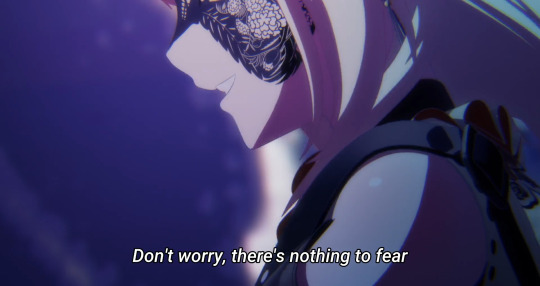
Admittedly when I first watched It's MyGO and Ave Mujica 0th, I didn't really think much of Uika. She and Doloris are presented as such vastly different entities that my brain kind of glossed over her, because I don't tend to go crazy for characters who are presented to us as always being bright and warm. Even when the last episode aired and I saw her undergo the transformation from Uika into Doloris, it still hadn't fully set in for me (though perhaps this is simply because I was busy losing my mind in excitement about seeing Ave Mujica at all as well as the sequel announcement).
But reading the interviews that came out after the anime finished airing completely changed that. Uika is Tomori's opposite in every regard? She has a secret so intense it made her voice actress stand out of her chair and yell when she heard it? I need to know more! What on earth could this seemingly kind character be hiding?
I've been keeping a close eye on her content ever since, and it's slowly making me feel insane. So, in anticipation for the anime, as well as their 4th concert which will happen in December and thus give us even more Doloris lore, I wanted to compile a post on the both of them in which I will present my various thoughts and theories.
Doloris
Uika is, in the most literal sense, Doloris' actress. This could perhaps lend to many believing that Uika is not Doloris, or rather that Doloris is not Uika. At the same time, I want to pose a very simple question.
Who came first: Doloris or Uika?
Timeline-wise, Doloris came first. Can Uika even exist without Doloris? Can she be who she is without us immediately recognizing her as being Doloris? What came first was not "Doloris is a puppet persona Uika plays as on stage," but rather it was "Uika is Doloris from Ave Mujica." This was their intent; to introduce Doloris to us, and then to introduce this girl who has an identical design to her in the anime, who is seemingly her exact opposite. What weight could Uika's scenes hold, if not to tell us that she will later turn into the monster known as Doloris? On her own, without Doloris, what does Uika represent?
Doloris herself talks about wanting to be seen for her true self. Is Uika Doloris' true self, or is Doloris Uika's true self? Which is it that they want us to believe? Which one does "Uika" want us to believe? Which one is Sakiko, or perhaps Oblivionis, trying to convince us to believe? Who is "Uika"?
Our introduction to this character was not a Sumimi scene, or her consoling someone, or a frame of her smiling, or of her expressing her love for music. It was this.
youtube
This creepy, disturbing montage of Doloris, covered in blood, inviting someone into her cult. Inviting you into her cult. Inviting you to dig deeper.
Though if you want to go even further back, I would argue our first, true genuine introduction was Black Birthday itself.
You see, I don't believe there's any true and correct way to interpret Ave Mujica's songs. The songs are whatever you make of them. That's part of the insanity of Ave Mujica; of never having a proper answer, of always wanting to dig deeper. So I won't say this is that correct reading, but rather one of the infinite possibilities. That said, after watching the intermissions from their concerts as we currently know them, I can't help but feel their first 6 songs perfectly tell the story of Doloris. It goes something like this:
Black Birthday: Doloris' rebirth into her true self. The dyeing of one's purity into corruption. Finally being able to see what was once unseeable (perhaps the light in the pitch black darkness, which she discusses a lot in their stage plays). It's a disturbing birthday party welcoming the new her.
The Two Moons ~Deep Into the Forest~: Now reborn, she finds herself lost in a forest. The play sequence in the last episode of It's MyGO feels reminiscent to this song; Doloris straying into a forest (Loft Moon), while Oblivionis ridicules her, and yet she's so beautiful she cannot take her eyes off her despite the pain of having her heart torn asunder. The song even has imagery describing candles lit on a table, which we can see in the anime rendition of this scene.
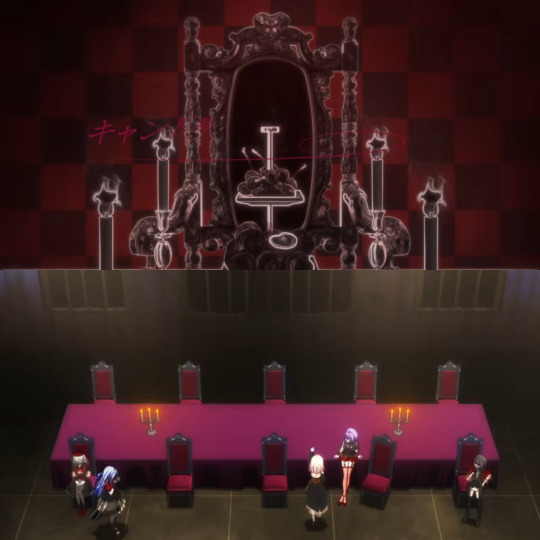
Choir 'S' Choir: She's slowly giving in to the insanity of Ave Mujica. This song reminds me a lot of Perdere Omnia; when she finally stops her denial and begins to understand why the others wish to destroy the world. She's letting herself become an esquire, a fallen angel if you will. She hears voices screaming at her, and she knows she's being hunted down, but she keeps dancing anyway. She's testing out her new abilities.
God, You're a Fool: This song represents her inner doubts. What exactly are they fighting for? For whose sake? Why do they have to be in this situation to begin with? If God wasn't a fool, surely everything would be fine... right?
Mas?uerade Rhapsody Re?uest: She's decided she no longer cares about anything. No longer cares how corrupted she becomes, no longer cares to hide her dark feelings. She's just going to fully embrace it all, she's going to let herself be taken by the shadowy jesters. The mask is a part of her now.
Ave Mujica: With her mask as her skin, it's her turn to lure others in. She's going to corrupt you. She reassures you that those with masks will fulfill your any wish, and that even though this is a place of no return, don't worry, there's nothing to be scared of.
It's interesting, because while the songs can apply to anyone (the other dolls for one, and perhaps even the listeners themselves), I can't ignore the parallels between the story these songs are telling, and the story of Doloris as we've seen in the concert intermissions. (Regarding the Utopia single and the ELEMENTS series, those songs were written more to fit a specific narrative, and I don't think they apply to the dolls themselves as directly. That's just my own personal take on them though and is why I won't be analyzing them here)
As for the intermissions themselves, there's a lot going on in them and much of Doloris' dialogue isn't about herself, but I want to go over some general observations:
Doloris uses 僕 (boku). This is significant because she's the only one who has a personal pronoun that differs from her actress; Uika uses 私(watashi). Ave Mujica songs use 私 (watashi) as well, though I don't think this means much in the context of Uika or Doloris because it's just for formality (if anything, it's interesting because it's an inverse of Uika's narrative opposite, Tomori; who uses 私 (watashi) in her daily speech but 僕 (boku) in her songs). That said, in Quaerere Lumina, there's a segment where "Doloris" switches to 私 (watashi), which many found haunting because it almost felt as if those words came from Uika herself, and that she switched back to Doloris after speaking vulnerable words from her heart.
She uses 君 (kimi; "you") in an interesting way. In Perdere Omnia, this referred to Oblivionis. In Veritas, however, she uses this repeatedly in the context of "someone" who she wants to be reborn with. It's someone who extended a hand to her, and who took her mask off her. It's someone she wants to be with for the rest of her life, just the two of them. And at the end, she uses it in reference to you, the audience, who will surely attend their next concert. Who is it that removed her mask? Oblivionis, or us? (Like many things in Ave Mujica, my own interpretation on this is that it's probably Oblivionis, because at its core, this is a yuri band, and Oblivionis is in fact someone who we've seen accept Doloris for who she is)
Each doll has a specific thing they focus on: Oblivionis stands her ground despite everything but also talks about finding things pitiful, Timoris is logical and an observer who wants to be acknowledged, Amoris talks about her lost love and boredom, Mortis talks about peace and quiet as well as the beauty in death. For Doloris, the thing she highlights that the others don't is us watching her slowly spiral into insanity, and particularly as of Veritas, her sense of her own body (as well as this attachment to someone else, as mentioned above). She sees herself as an empty shell, which is true for the others as well, but on top of this she has a fixation on her mask and the relationship it has with her body. It's her skin, and simultaneously, if you remove it, below that you'll find her true, perhaps ugly self. It means a lot to her that someone could love the her that exists without the mask. (Is this intended to be foreshadowing for the relationship between Doloris and Uika, and which of the two of them is her truest self?)
Doloris is an embodiment of insecurity, and simultaneously, she's a ferocious monster when she performs. Rico Sasaki herself claims that she feels like Doloris possesses her when they hold concerts. Her voice is cold, bitter and pained; it's a far cry from Uika's speaking voice, which is so warm and comforting. She is plagued with sorrow, of which she would rather die and be reborn than have to deal with. Her ideal world is simply one of being together with the one who accepts her in all of her ugliness.
Uika
There's a sort of trend to Uika's scenes: when she's around someone else, she waits for them to talk or express emotion before she matches their energy, and when she's alone, she drops the happy idol facade. The very first time we ever see her, she's doing just this.
This is also apparent in two other (coincidentally Sumimi) scenes, where the same thing happens in each: Uika is matching the energy of who she's talking to, but the second she's separated from them by a door, she has an almost empty expression on her face.

(The fact this has happened for both Sumimi scenes, when Uika has so little screentime so every second we see of her is supposed to be precious, has me really wondering just how much she likes her "dream job." Also, I wonder if this is a coincidence: immediately after both of these shots, she looks at her phone and sees Sakiko on her screen which cheers her up (the first is an old text, the second is a phone call))
It's something that on its own feels a bit deliberate, but when you take a certain intermission from their concerts into consideration, it really does become something you can't ignore.
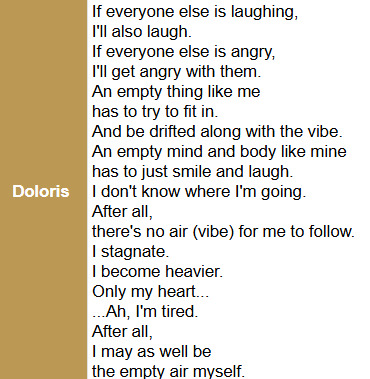
This is the one part of the concert intermissions in which Doloris uses 私 (watashi). This is what many interpret to be Uika's words.
To put this simply, she feels as if she's an empty shell who has to match the energy of the people around her. When nobody is there to give her something to react to, she reverts to that husk. This is exactly the vibe I get from a lot of her scenes in the anime.
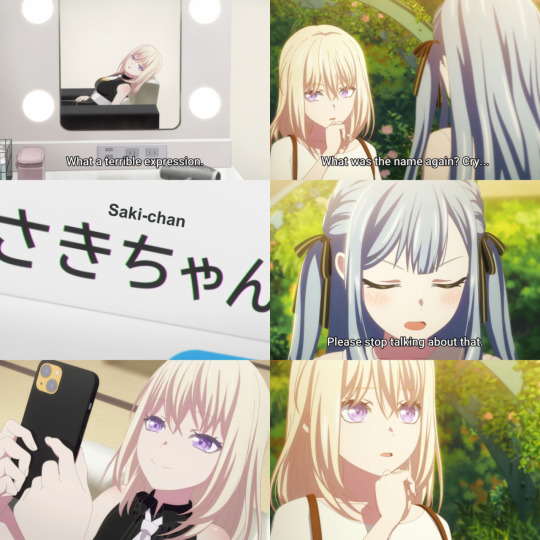
(I talked in depth about these two scenes in my Taki&Uika writeup so please do check that out for my thoughts on them, but to recap for this context: it's interesting to me how she looks so "empty" until she reads Sakiko's message (and feels seen by her, thus breaking her out of that state; I also want to mention she never messaged Sakiko first despite having her phone number, which to me is such an explicit example of her feeling like she doesn't exist unless someone else contacts her first that you may as well have a bright red arrow pointing at it), and on the right we can see her matching Sakiko's energy)
And actually, she almost implies as much to Mana directly.
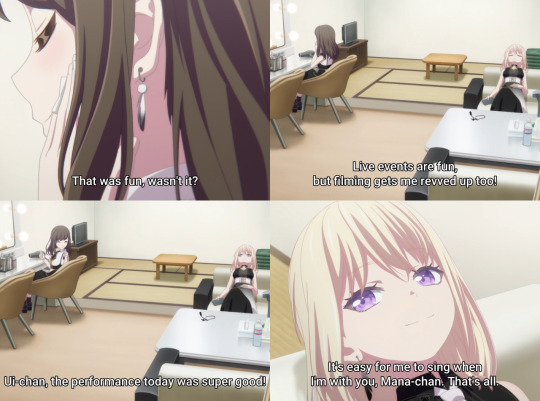
"It's easy for me to sing when I'm with you, Mana-chan." On the surface, this just seems like something she's saying to make her excitable partner happy, to show agreement even though she's exhausted and not nearly as excited as she is. Mana reacts, calling it a compliment. But is it really? Her wording here is deliberate: she can only sing well because she's with her. Because she's being seen by someone else. Watching all of their scenes, I can't shake the feeling that Uika would not "shine" as an idol without Mana by her side. Immediately before this, Mana's happily waving and thanking the filming crew while Uika gives them a more heartless nod. Uika's appeal as an idol is that she's "cool" (this is written on her character bio), so it's not that I would expect her to match Mana's energy in that sense (who's appeal is her energy)... but I do wonder what she would be like in this context without Mana, given she already seems rather tense even with her. (Here's an easily missable clip of her sighing the second she's alone)
What about her comforting Tomori? Surely that was the one scene where she was acting of her own emotions? And what about when she talked to her in the final episode? It's not as if she was matching Tomori's energy 1:1! She reached out to her on her own!
And maybe that's true. However, consider this: that happened after she got Sakiko back in her life. Is an empty husk still just a shell if the one who's there to look at her―and bring her to life―is by her side now?
Let's take a closer look at these scenes though, shall we?
The planetarium. Uika was there to look at the stars, which are reflective of her childhood memories with Sakiko. Then, she finds Tomori, who she recognizes as being from Crychic (because she attended their concert a year ago). I could believe it if she sat next to her because Tomori looked upset; Tomori has subtle facial expressions yes, but it's pretty obvious when she's hurt. She decides to sit next to her, but her seat won't recline (I've seen people point out that she's been there before, so she surely would have known how to put the seat down; I think this is very funny and could be true, though I do want to point out Tomori said "this seat works like this" and Uika was sitting in a different seat than we saw in episode 8 anyway). Tomori helps her and they make indescribable eye contact briefly before they go back to watching the stars.
Then she kept an eye on her when they left and caught her on the stairs. Pretty standard stuff. From the get-go though, she was matching Tomori's energy. This is really subtle and more obvious in motion, but when she's asking if Tomori's okay, Tomori's head dips down twice, and each time Tomori's head dips, Uika's dips down a second or two later to match her.
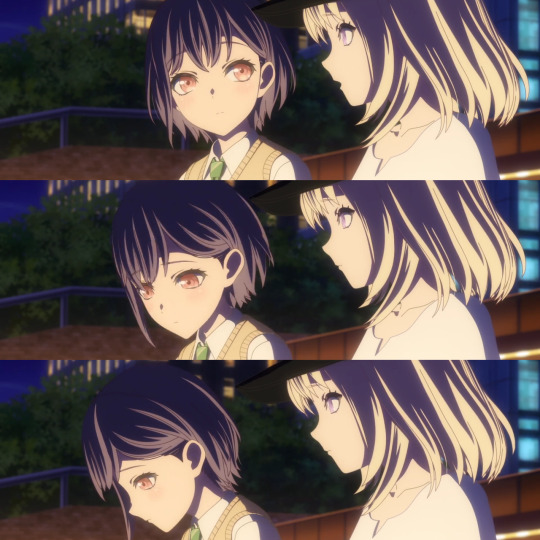
If it was just once, I wouldn't think anything of it, but twice? Why is she studying her reaction this closely to the point of replicating it?
Then this happens, and I'll just leave my commentary from a year ago because it still applies:
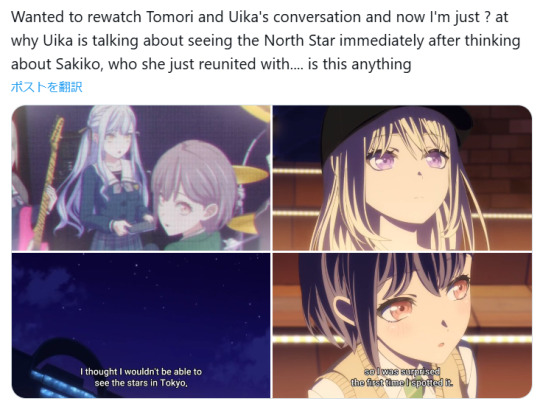
Uika stares at Tomori and the Crychic photo that she saw on their social media comes to mind. She focuses in on Sakiko and Tomori... but moreso Sakiko. This kind of goes under the radar as it comes across as her bringing up stars because she knows it's something Tomori clearly likes and thus could be a bridge of conversation between them, so to speak, but I can't shake the fact that thinking about Sakiko was what prompted her to start talking about the stars she can see in Tokyo. Sakiko, who she was separated from for so long and who she was only able to reunite with in Tokyo.
(As a side note before I continue, this conversation makes me wonder how familiar she is with Tokyo. I'm not well-versed in Japan's geography nor do we really know anything about Uika's personal life, but I do know she lived on an island as a kid because she says Sakiko visited her island. It's also her chat icon)
Another easily missable detail, but when she picks up Tomori's notes, she waits a second for Tomori to give "consent" (via eye contact) before she continues talking. I'll also just mention here that I do think Uika meant what she said about singing being something that conveys someone's heart, and I feel like this was the most honest she was in the entire show.
Moving on to the episode 13 confrontation. I'll be honest, this whole interaction is very weird and as I'm typing up this post I'm still not sure what to make of a lot of it.
Once again, Uika is in the planetarium, this time in the same seat she was in for episode 8 before she met up with Sakiko (starting to see a theme here). Then she spots Tomori and grabs her shoulder, calling her Tomori-chan. Tomori seems confused so she checks that it really is "Tomori" and says they met there before. She does the same thing she did in episode 10 where when Tomori shifts her head, she shifts hers too while she's talking to her.
I like this shot because it feels like she instantly goes into "handsome" mode when she realizes this girl is a fan of "Sumimi's Uika."

This is where this interaction gets weird, because Tomori says she doesn't know who Uika is, and Uika responds with... "I'm glad she doesn't." Huh? Even Anon herself says "Huh?" out loud here. I could not possibly give you an explanation for why Uika would be "glad" that Tomori doesn't know who she is. Why is she trying to get close with her if she doesn't care that Tomori doesn't know her?
Then she asks if Tomori's song worked and Tomori says yes. It still feels like she's trying to gauge her feelings (but for what?). Then she claims she doesn't know Tomori, they just "met at the planetarium before." Anon seems pretty weirded out still. Then she changes the subject and asks if the two of them are in a band. When Anon shows her her phone, which has all the band members listed, she stares at it for a second before asking if she can follow.

(Anon's face being cut off here is interesting to me given this is from Uika's point of view, and really what could be so interesting in that photo?)
The length in which she stares at it makes me think this is likely how she learned MyGO exists, though I can't really piece together what she gets out of this aside from knowing what band Tomori is in. Then she asks if she can follow them and leaves. The whole interaction feels so pointless yet so deliberate: we didn't get closure on Taki's character arc in this episode, but we got this scene of Uika following MyGO's social media account? I'll be interested in seeing how this is relevant later on.
Oh, and the most important part of this scene: Tomori never told Uika her name. Anon is visibly weirded out by this. Of course, this scene is also followed by another shot of Uika not having to match anyone's energy, looking stern as she seems to whenever she's by herself. (She's looking at Crychic's social media page and commenting on how Tomori is from Sakiko's old band, by the way; how did she pull that up so fast? She just sat down?)
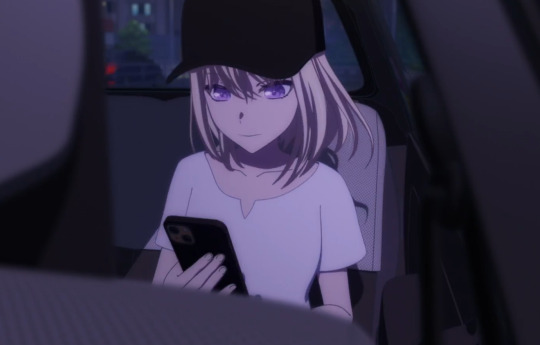
Uika and Tomori are narrative opposites. The director for the anime stated that Uika is her polar opposite in every regard. Ricochi also pointed out that while Tomori's songs turn her human, Uika's turn her into a monster. Their episode 10 confrontation was intended to be them meeting before the Ave Mujica ball gets rolling, so to speak, in order to allow them to contrast greater when the sequel comes out.
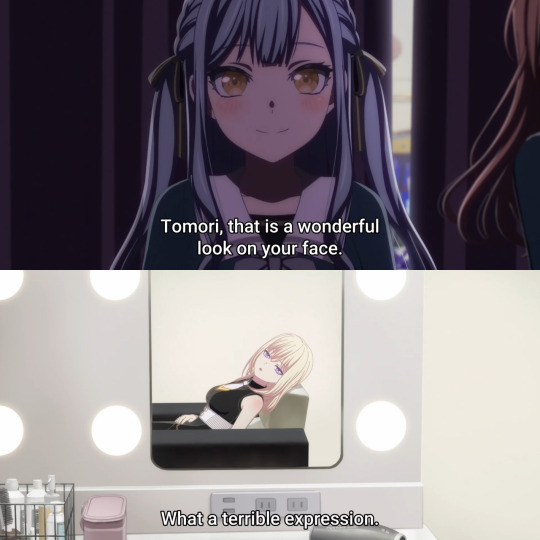
In general, what I make of Uika's cheerfulness is it's reflective of something Ricochi said in regards to Ave Mujica as a whole: like the moon, she can't shine on her own, but when others look at her, a light glistens from her. It almost makes me wonder if she wanted to become an idol in order to, like she said in her introduction clip with Mana, "make others feel better too" with her songs, at an attempt to mask the fact she can't shine when she's alone herself.
Those are the biggest points I wanted to articulate, so below I'll drop some other observations.
Regarding the flashback scene of Uika and Sakiko as kids... Uika is blushing here when Sakiko is not.

Normally I wouldn't think anything of this, because that's just how the models are (for instance, Sakiko's casual clothes model seems to always have the blush regardless of her mood, while Oblivionis of course doesn't; Uika's model also doesn't have a constant blush), but this scene was hand drawn. It's more deliberate. I don't want to insinuate that this implies Uika cares more about Sakiko than Sakiko cares about Uika because I don't think that's what they meant here at all, just that these specific memories may hold different meaning to Uika than they do for Sakiko. Perhaps more importantly though (and even less obvious) is that Uika's hair looks longer in the shot of them looking at the stars than it was for their meeting and the bug catching. It makes you wonder how much time may have passed between those two memories. (I do recognize this may have just been a continuity error of sorts, but she is wearing a different outfit too)
In Sakiko's conversation to Nyamu, she hints that she got Uika for her band because of Sumimi's popularity. This is interesting to me because in episode 7, she absolutely... glares? at the Sumimi music video.
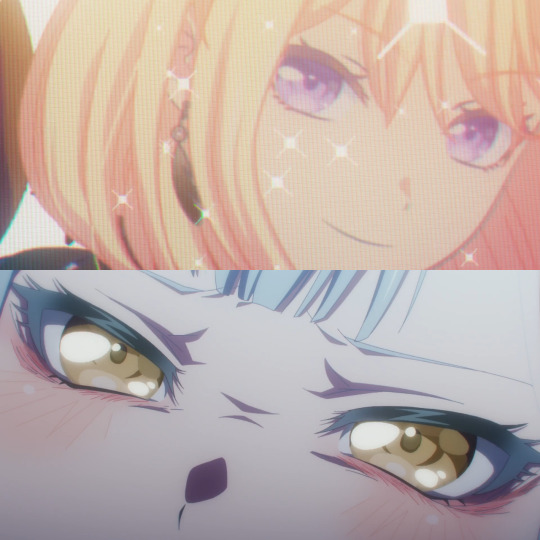
...Which makes you wonder how she really felt looking at it. In any case, I don't think it was just for the fame because you don't exactly call somebody and tell them to help you forget everything if it's just for the money. That's a pretty intimate thing to ask somebody, and especially for Sakiko who up until then had been actively avoiding speaking anything from her heart. We also know that Uika does the lyrics for Ave Mujica, so we can truly only make guesses as to what transpired between their talk and the final episode...
Oh, also, when Sakiko calls Uika, she blushes. Which feels pretty notable to me when seconds beforehand she was in "cool, kind of broody idol" mode.
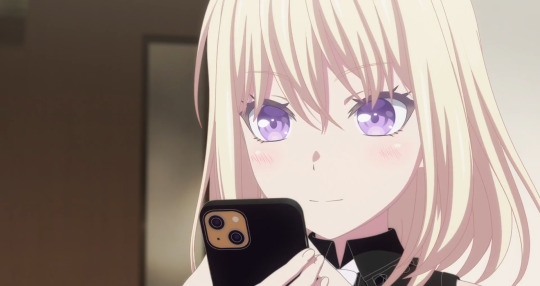
As for the last episode...
When Nyamu asks if she can go to Uika's place, she says yes! It makes you wonder how close she is with everyone by this point, and also what her home life looks like.
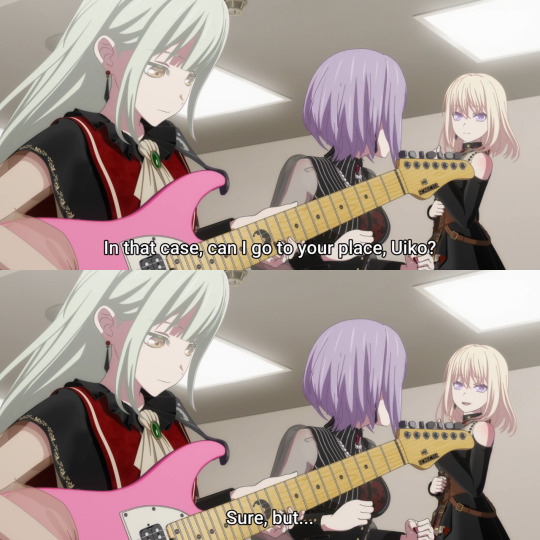
This one is sold on the voice work, but she sounds super happy to get to see Sakiko.
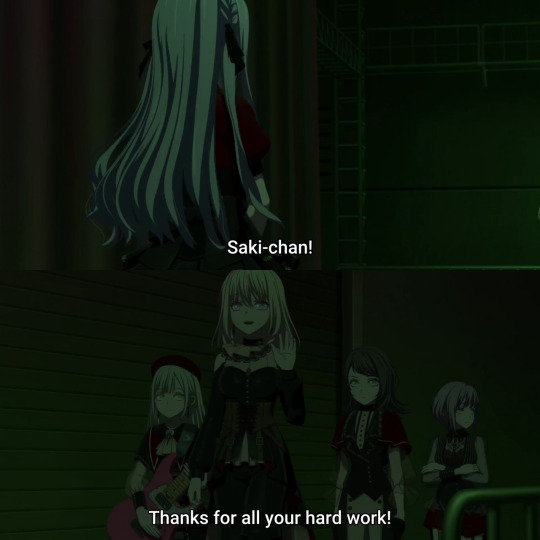
This also happens at the end of the episode, when she asks if she can ride the train home with Sakiko despite the fact she got there in a cab. I wrote my thoughts about this here, but it is interesting to me how it implies she might not know about Sakiko's home life at this point.
For this line, it's not lost on me how similar this dialogue is in reflection to what Doloris says in their stage play immediately after; with Oblivionis talking about them being dolls, and Doloris questioning her every word. It's as if she'd turned into Doloris the second she put her mask on...
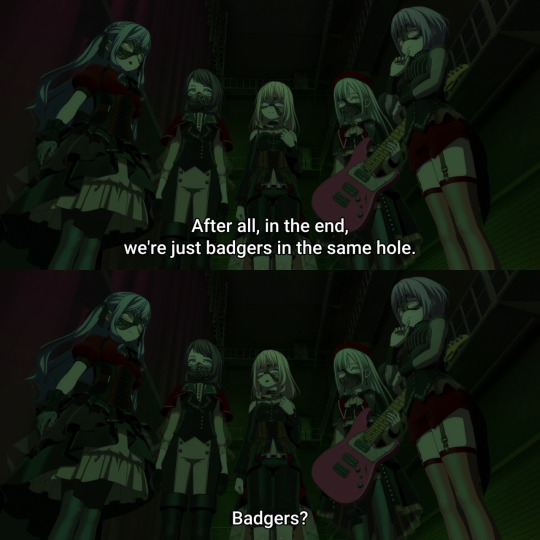
Tying it all together
What's striking to me is that in all the trailers for the Ave Mujica anime―which by all means will be where we learn more about Uika―we've only seen one shot of her.
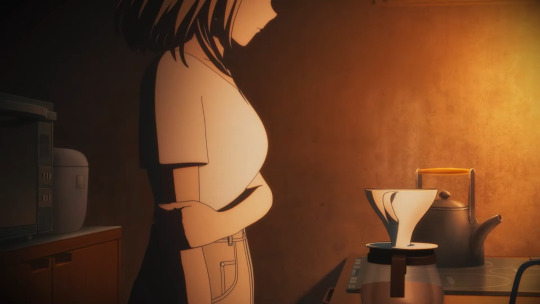
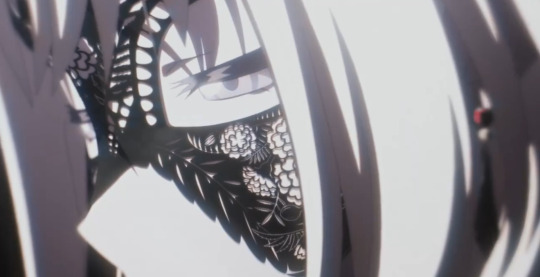
The rest have been Doloris. From this we can presume that the doll lore from their concerts will be relevant to the actresses, we just don't know to what extent.
It's scary really, because... seriously, even if Uika does feel like an empty shell, there's more to it than just that. And despite all of my analysis up until this point, I have not a single clue what her actual deal could be. Even after I post this, I'll continue to watch her scenes over and over, trying to piece things together with what little we have right now.
I'll be very interested to see both Doloris and Uika in the upcoming anime, and in what ways the lines between them are blurred.
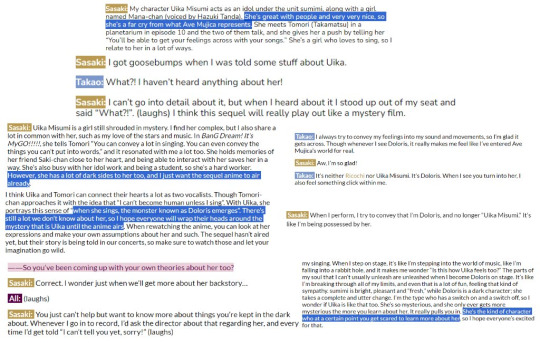
143 notes
·
View notes
Text

#writing#writeblr#writers on tumblr#writerscommunity#art#writing memes#ave mikesszz#booklr#funny memes
2K notes
·
View notes
Text
Ave Mujica Thoughts (not spoiler free)
Seeing Ave Mujica while knowing what is inevitably going to happen with Uika is such a wild experience, and I almost wish I’d gone into it not knowing what her voice actress has said about her (i.e. that she is truly scary, and that Sasaki Rico was genuinely surprised by some of her lines.) Seeing Uika and waiting for her reappearance these past few episodes, knowing this, has been like a ticking time bomb. But if you disregard what we know about Uika from sources other than the anime, her portrayal gets really interesting.
Without any sort of religious symbolism tied to her character directly, Uika is practically pronounced as a holy figure. She wears all white, and is a mysterious, far-away and untouchable singer, part of a popular idol band that is completely free of scandal, unlike Ave-Mujica. She has done nothing so far that could possibly be controversial to anyone, while the moral-greyness of every single other character is being explored. She continues to be a figure of kindness towards Sakiko, mainly. Even when Mutsumi accuses her of “lying” in episode four, it doesn’t really land, because Uika didn’t really lie so much as try to deflect to fix the disbanding situation. Even before Ave Mujica, Uika is atop a pedestal, shown when she gives Tomori advice… in the PLANETARIUM. Our perception of her since then has not changed much.
Her character remaining sort of holy and free of sin up until this point is notable mostly because of her clear obsession with Sakiko. In my opinion it goes past just appreciation or yearning, and is a true obsession. Typically, when a girl’s obsession is unrequited (especially romantic, though I don’t know how far Bushiroad will go with that… Uika’s obsession does seem to be characterized differently than the rest) the character who yearns after the other is portrayed as gross, unbecoming, or weird. But Uika, through the eyes of the story, is never portrayed in this way. Additionally, the series doesn’t ever make it seem like Sakiko is in the wrong for not reciprocating Uika’s obsession. It can seem at first, like an unbiased account of the two girls’ interactions. Until you remember who narrates this story.
Since Anon narrates MyGo!!!!!, she must learn about Crychic from the outside. At first, characters that Anon (and therefore, the viewer) have a bad opinion of, like Taki and Sakiko, are somewhat redeemed as we find out their backstories. Since Uika is the one who narrates Ave Mujica, I wouldn’t call it unbiased at all. Sakiko is understood from the get-go. Uika extends compassion to her through the narrative- making sure that the viewer will forgive her by positioning her exposition in the very first episode. By this logic, Uika also controls her own self image. The entire narrative falls away to center around Uika and Sakiko. Uika is the clear uncommon pick for Ave Mujica, and it causes her scandal to participate in both Sumimi and Ave Mujica. There are reasons that joining Ave Mujica HURTS her. She is the only person in the band who is there solely for Sakiko. Mutsumi is here because Sakiko has dragged her here. Nyamu is here because Sakiko guaranteed her fame (Nyamu DOES care about her band members, but cares about the audience more. I don’t think this makes her shallow, and I could better explain in another post.) Umiri is here because of her obsession with the band atmosphere. Uika is the only one here ONLY for Sakiko. She has crafted a narrative where she is the only person whose desire for Sakiko is pure, and all-forgiving. Uika is ultimately the one who pulls the strings, and the only one for Sakiko. Who truly wants and deserves her (other than maybe Tomori, who coincidentally… appears when Uika’s narration is absent).
The last few episodes have been, in a sense, so scary because Uika’s narrative voice disappears. She has been markedly absent. She hasn’t had a huge personal impact on the story’s events so far, but she is certainly about to. This portrayal of Uika and her desire as divine and deity-adjacent has also done another thing; portray Uika as immensely powerful within the narrative. Her focus in the opening and practically any promotional work has also cemented this. I believe Uika’s desire is about to be usurped in some way, and I believe her reaction to this is going to be basically turning into a supernova. Her desire for Sakiko from now on may be seen as a corrupting force to her character, but she still nonetheless has the power if not the purity of a God. She is going to destroy the narrative in ways that I can’t even predict.
#ave mujica#uika misumi#uika#sakiko togawa#uisaki#bandori#essay#bang dream#writing#mortis ave mujica#avemygo#mutsumi wakaba#umiri yahata#nyamu yuutenji#nyamuchi
54 notes
·
View notes
Text
I think when Oliver falls in love with you, it's a form of worship. He starts watching you because he wants to see your eyes light up as you talk, arms gesticulating wildly, laugh unabashed and unrestrained — there's salsa on your shirt, and on your pinky, and he tracks all of these details about you and notes them fondly. He starts to want to do all of these things for you that he hadn't cared to before: bring you flowers, gift you chocolates, leave his hoodies behind at your place. He only realizes the depth of his love when he has you in front of him, casual shirt and jeans, when he notices himself tucking away your every gesture into his heart.
He doesn't realize it when you're in his bed, under him, where he's had dozens of women and men before you. He doesn't realize it on your dates either, not with the restaurant's ambiance and carefully curated romance overhead.
Instead, it slams into him when you're just two people in the same space, painfully human, and he's still watching you as if he's inking you — your presence, your motion, your spirit — carefully into the canvas of his retina.
196 notes
·
View notes
Text
In this episode of Ave Mujica our lead heroine realized that her wealth and privilege outweighs human morality allowing her to do whatever she wants, so she usurps the power of a cruel zaibatsu conglomerate with a little bit of blackmail.
She and a girl who committed identity fraud to stalk her elope together on a Titanic and engage in synchronised breathing a lot. The lead heroine finally had embraced the girl's desire to chain her in the basement for all eternity.
Back at home, her colleagues—a girl with DID, an anxiety-ridden wreck and a streamer—are worried because their cult leader (whom they gaslit into group marriage) has been missing.
Thankfully the lead heroine comes back—and she has finally decided to become God.
...
This is a show about high-school girls playing together in a band.
#ave mujica#ave mujica the die is cast#bandori#bang dream#bang dream ave mujica#ave mujica spoilers#spoilers#spoiler#sakiko togawa#uika misumi#nyamu yuutenji#umiri yahata#mutsumi wakaba#meta post#writing#tv shows#anime
176 notes
·
View notes
Text

tonight’s episode is titled “odi et amo”, the first line of a famous poem by catullus, a roman poet. the poem goes,
Ōdī et amō. Quārē id faciam fortasse requīris. / Nesciŏ, sed fierī sentiō et excrucior.
(I hate and I love. Why I do this, perhaps you ask. / I know not, but I feel it happening and I am tortured.)
catullus wrote this poem for his lover, lesbia. and i. i dont have a lot to say bc the poem is so famous and gut wrenching and it relates so well to uika’s internal turmoil but pls lemme make a yuri joke here. catullus’ lover lesbia. mentioned in the yuriful avemuji. i cant with this show anymore.

and can i point out that sakiko is READING DEMIAN. revolutionary girl utena ahh character. BREAK THE SHELL SAKIKO 🥚
#i have been anxiously working on school stuff so i could only noticed now lol#fun fact i had to learn this poem by heart in high school for my latin class with the correct cadence and all#and about demian. it’s heavily referenced in utena and imo has even inspired it (writing an essay about it lol)#ave mujica#avemuji#bandori#sakiko togawa#uika misumi#nyamu yuutenji#umiri yahata#mutsumi wakaba#mortis ave mujica#bang dream#mine
62 notes
·
View notes